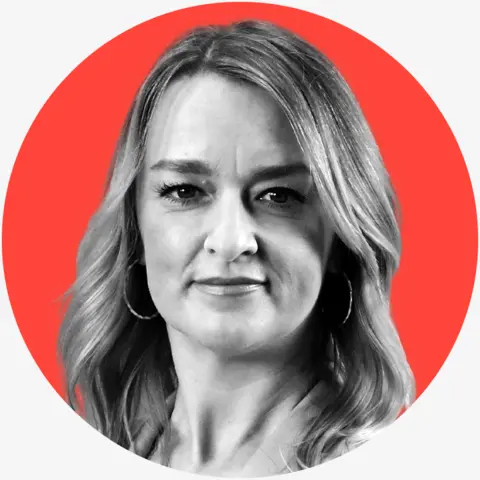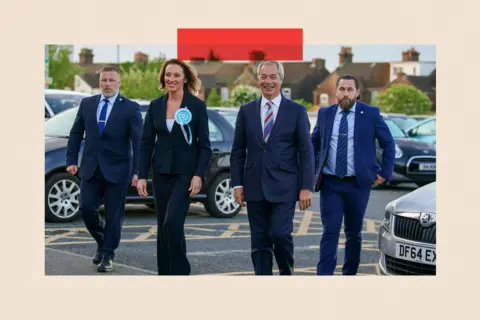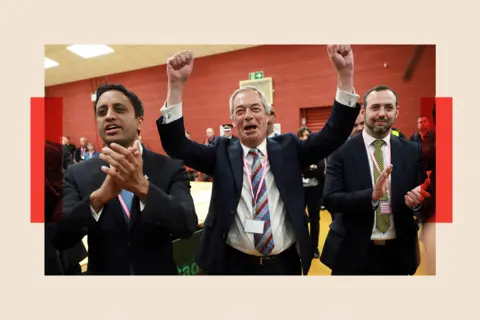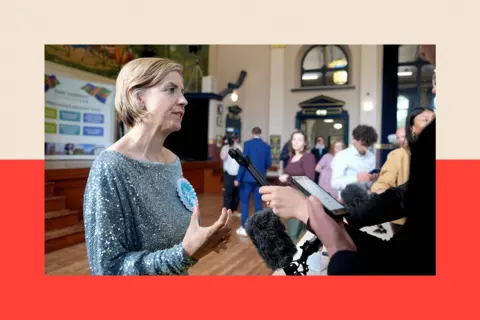This week proves Nigel Farage's PM ambition is not a wild notion

 BBC
BBCIn the first week of 2025, Nigel Farage told me his ultimate goal was to become prime minister. It stuck in my mind that he chose to add: "I'm not joking."
Nobody in the two traditional main parties finds his stunning success this week funny. "Farage is no longer someone we can just laugh off," a former Conservative cabinet minister told me. If the idea of Farage in No 10 seemed outlandish in January, the backing of millions of voters this week shows it's not a wild notion.
The next General Election is, of course, miles away. Parties can surge and sink. But this week's results show that Farage has changed the race.
For Labour, it's a race to prove that government can actually be a force for good. Minister after minister trotted out the same lines as the results came in – waiting lists are starting to come down, the minimum wage has gone up, and new breakfast clubs are opening in schools. I could almost recite their script by the end of our election coverage.
There is little appetite in No 10 to budge on any of the big decisions they've already made, however many times internal critics, and increasing numbers of loyalists, complain about cutting winter fuel payments or raising employer National Insurance contributions.
But Downing Street is desperate to show that despite its unpopularity in the polls and grisly performance in real elections, there are signs of progress. Labour is well aware its main rival at the next election could be Reform, not the Tories – the disappointment and disillusionment felt by some in the UK finding a voice in Farage.
Yet has the party's top brass understood how serious the threat could be?
 PA Media
PA MediaOne party veteran suggests it's only "just starting to dawn" on those at the top, warning "the coming years could be existential for Labour".
While the government can 'do', opposition parties can only 'say'. For the Tories it's now a race to look like a serious outfit and for Kemi Badenoch it's a race to become not just a leader who voters recognise, but one they warm to.
In politics it's often said you're quick or you're dead – but the Conservative leader's pitch to her party was "Renewal 2030", and she's repeatedly suggested her approach is to have a long, hard think about what the party should do next.
There is a push for Badenoch to do more faster, and to be more visible. A former council leader has called for her to resign.
Another said the "main part of the job is grabbing attention – it doesn't matter what you do if no-one sees or hears".
Badenoch will join us on Sunday's programme alongside Health Secretary Wes Streeting, Lib Dem leader Sir Ed Davey, Green co-leader Adrian Ramsay and Zia Yusuf, chairman of Reform UK.
Pollsters report that six months into the job, Badenoch is still an unknown for huge numbers of voters. Farage is a past master at grabbing headlines, seizing on issues other politicians are sometimes reluctant to, talking in terms that raise eyebrows, creating rows and news coverage.
Reform has already been ahead of the Conservatives in the polls for months – and many Tories acknowledge privately it's not impossible that Farage's party could replace them in the medium term. It's "not inevitable", one of the former ministers said, "but we have to throw everything at it to make sure it doesn't happen, not just hope or guess".
 Reuters
Reuters PA Media
PA MediaThe race for Reform is to show that they can go beyond effective campaigning to running things. When they walk over the threshold of county halls and mayors' offices for the first time, they cross the threshold from being a party of protest to a party with responsibility.
They have built a campaigning machine, a brand, and a platform at breakneck speed with lots of money to spend. But being in charge, making choices that affect voters' lives directly, is a different job. We know relatively little about how they'll operate beyond promises of opening the books, Elon Musk-style, and rooting out waste.
When pressed for what that would mean, Reform has mentioned council equality officers being axed, and cutting spending on cycle lanes or traffic calming zones. When asked how they would close asylum hotels, as promised in the parts of the country they'll run, Richard Tice, the deputy leader, said: "I'll come back to you."
One of Reform's new mayors, Dame Andrea Jenkyns, suggested migrants could be housed in tents instead. With responsibility comes scrutiny, and you can bet the other parties will be watching like hawks and seize on any mishaps.
But this week's extraordinary success for Reform UK is leading an increasing number of politicians in the two traditional big parties to ponder how deep the public's disillusionment really is with the political system – and what they can really do to address it.
One member of the government told me they have to deal with "anger and frustration. Rebellion. Patriotism. A big four years coming up".
A shadow minister, referring to both the Tories and Labour, said: "We're not connecting and politics isn't working… either Labour will be able to get themselves sorted and show government can work, or Reform will win."
The Liberal Democrats had impressive advances this week too, and the Greens made some steady progress. The elections were only in England and at a UK-wide level the jigsaw is already much more complicated. But voters' decisions this week have shaken the central dynamic in our national politics, which is always, in the end, a fight between one big bloc on the left and one big bloc on the right.
Our two-party system has been declared over on many previous occasions – then miraculously survived. But after this week, you wouldn't say it could never happen.
That week back in January when Farage declared he wanted to get into No 10, a senior government figure told me that their party "mustn't over think the threat" Reform posed. After this week, that is a phrase they'd be unlikely to repeat.

Sign up for the Off Air with Laura K newsletter to get Laura Kuenssberg's expert insight and insider stories every week, emailed directly to you.

BBC InDepth is the home on the website and app for the best analysis, with fresh perspectives that challenge assumptions and deep reporting on the biggest issues of the day. And we showcase thought-provoking content from across BBC Sounds and iPlayer too. You can send us your feedback on the InDepth section by clicking on the button below.
